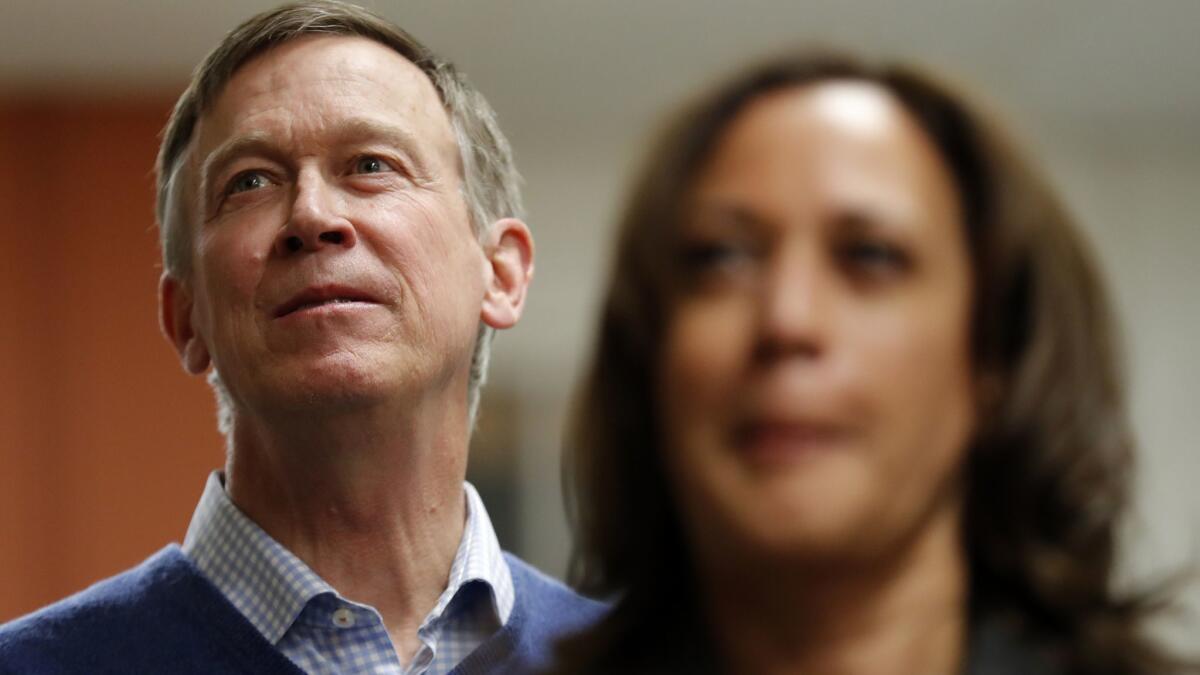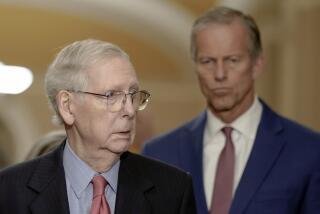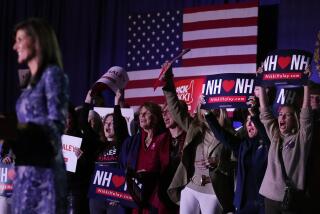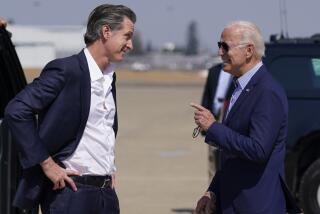Doers versus talkers: Governors compete with senators in Democrats’ 2020 field

Wading into a crowd of U.S. senators running for president, governors have begun entering the field with a fresh line of argument: As executives, they are doers, not talkers.
“People in Washington, they spend their lives talking about stuff, debating, pointing fingers and blaming the other side,” former Colorado Gov. John Hickenlooper said Friday in a swipe at his Senate rivals during his first tour of Iowa after his campaign launch.
“It’s about time to get people together to get stuff done,” he added.
The fate of Hickenlooper and other governors running for Democrats’ 2020 nomination could be a window on the evolving mood of the electorate — whether Democratic primary voters are as infuriated with Washington gridlock and divisive politics as they are with President Trump.
The governors could also shift the nature of a field dominated for months by senators with national reputations and fundraising networks. After a winter in which the Democratic debate has been shaped by those senators, mostly on the party’s left, competing to propose bigger, bolder progressive policies, the governors could move the conversation in a more pragmatic direction.
In the past, governors have been seen as stronger presidential candidates than senators because of their executive experience. Four governors (Jimmy Carter, Ronald Reagan, Bill Clinton and George W. Bush) but only one senator (Barack Obama) have won the White House in roughly the last half-century.
But the Trump era suddenly has put governors at a political disadvantage.
Trump has monopolized public attention and news coverage, especially on television. Capitol Hill — with its high-profile hearings and pitched legislative battles — gives senators a national platform for battling the president, a top priorityfor party activists and donors.
Democrats, facing a big candidate field, ask: Who can beat Trump? »
The traditional claim of pragmatic executive ability still appeals to some voters.
“Getting stuff done — that’s a trait sorely missing in the national debate,” said Shane Church, a former Colorado resident who came to hear Hickenlooper speak at a Des Moines brewery.
For others, however, infuriated by Trump and his party, that message seems thin gruel.
“I’m more interested in candidates with big ideas and ambitious policies,” said Dan Fessler, a Democrat from West Des Moines.
“That working-with-Republicans stuff doesn’t work for me,” he said. “I don’t want to work with Republicans. I just want to destroy them.”
In addition to Hickenlooper, the governor of Washington, Jay Inslee, has entered the 2020 race, spotlighting climate change and what he has done to combat it in his state. Montana Gov. Steve Bullock is considering joining the field, touting Democratic accomplishments in a Republican state. Former Virginia Gov. Terry McAuliffe is also considering abid.
Who’s running for president and who’s not »
Carter’s election in 1976 offers a particularly encouraging model for the governors. Little known before he won the Iowa caucuses, Carter captured the nomination in a 13-candidate field that included six senators.
But governors seemed to lose their cachet when facing the surly electorate of 2016. In the Republicans’ record-breaking 17-candidate field, more than half were sitting or former governors. They included stars of the GOP: Scott Walker of Wisconsin, Chris Christie of New Jersey, Rick Perry of Texas, John Kasich of Ohio and Jeb Bush of Florida.
All were trounced bypolitical novice Donald Trump.
“We’re in a new era right now,” said Jon Thompson, former spokesman for the Republican Governors Assn. “Voters aren’t necessarily looking for experience. Republican voters in 2016 were looking for someone to shake up the status quo.”
The same might be said about Democratic primary voters this year: Nothing matters more to Democrats than changing the White House status quo.
One thing it will take to beat Trump is strong fundraising, and on that front, several senators have a head start because of national donor networks they had before they even entered the presidential race. Bernie Sanders, the last obstacle to Hillary Clinton for the Democratic nomination in 2016, raised $5.9 million within 24 hours of announcing his candidacy for 2020.
Governors from small-population states like Colorado, Washington and Montana have trouble raising money nationally, said Howard Dean, who ran for president in 2004 after serving as governor of Vermont. Dean overcame his own small-state handicap to become a top fundraiser in that race because his opposition to the Iraq war appealed to small donors from across the country.
“That’s what helped me,” he said. “They have to have something like that.”
Hickenlooper says he raised $1 million in less than 48 hours, from donors in all 50 states. Campaign spokeswoman Lauren Hitt said that Hickenlooper developed donor contacts nationwide in 2008 when he raised $60 million to host that year’s Democratic National Convention in Denver.
Inslee has embraced an issue with national appeal in his call for aggressive action against climate change. And, while just about all the candidates agree on that environmental goal, Inslee can point to concrete actions he has taken as governor to promote renewable energy, electric car innovations and energy efficiency.
His campaign says he raised $1 million in the first three days after launching his run. He also benefits from a super PAC called Action Now on Climate, which announced a $1-million ad buy to promote his candidacy.
Both Inslee and Hickenlooper, however, are little known outside their home states. In a January Monmouth University poll, just 23% of Democrats and Democratic-leaning independents knew enough about Hickenlooper to have an opinion about him: 13% had a positive view and 10% were negative.
Inslee, whose name recognition was even lower, has work to do reaching voters like Megan Stanek, a school nurse who attended a Sanders rally in Council Bluffs, Iowa. She said that combating climate change was hands-down her No. 1 issue, but had never heard of Inslee.
Bullock is not expected to announce a decision about running in 2020 until after his state legislative session ends in April. But he has already hired staff in Iowa and made several visits there. He tells Democrats about his legislative and political successes in Montana, where he won reelection in 2016 at the same time Trump won his state by 20 points.
McAuliffe has set a March 31 deadline for deciding whether to run for president, a bid that would spotlight how he helped steer Virginia in a more liberal direction during his four years as governor. Not surprisingly, he agrees with his fellow governors that state executives have better training for the presidency than senators.
“A governor is CEO,” he said recently on CBS’ “Face the Nation.”
“We build roads; we fix roads. We do need governors in this race because, you know, we don’t just get to talk all day; we’ve got to deliver every single day.”
More to Read
Get the L.A. Times Politics newsletter
Deeply reported insights into legislation, politics and policy from Sacramento, Washington and beyond. In your inbox three times per week.
You may occasionally receive promotional content from the Los Angeles Times.







